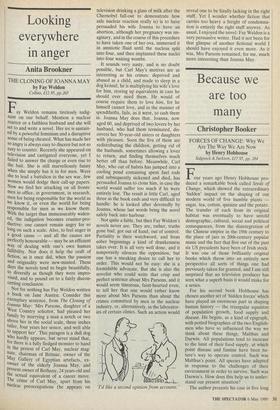Looking everywhere in anger
Anita Brookner
THE CLONING OF JOANNA MAY by Fay Weldon
Collins, £12.95, pp.265
Fay Weldon remains tirelessly indig- nant on our behalf. Mention a nuclear reactor or a faithless husband and she will set to and write a novel. Her ire is sustain- ed by a powerful feminism and a disruptive sense of being cheated. What has made her so angry is always easy to discern but not so easy to counter. Recently she appeared on television and castigated everyone, yet I failed to answer the charge or even rise to the bait. She is still marvellously funny When she simply has it in for men. Were she to lead a battalion in the sex war, few women would dodge their call-up papers. Now we find her attacking on all fronts: men in office, in government, in research, men for being responsible for the world as we know it, or even the world for being responsible for men as we know them. With the target thus immeasurably widen- ed, the indigation becomes counter-pro- ductive: one cannot remain angry for so long on such a scale. Also, to feel anger in a good cause — and all the causes are Perfectly honourable — may be an efficient way of dealing with one's own human fallibility. Nor does it help the craft of fiction, as it once did, when the passion and originality were new-minted. These days the novels tend to begin beautifully, to diversify as though they were impro- vised, and to pound on to a fairly discon- certing conclusion.
Not for nothing has Fay Weldon written a book on Jane Austen. Consider this exemplary sentence, from The Cloning of Joanna May: 'Mrs Parsons, daughter of a West Country solicitor, had pleased her family by marrying a man a notch or two above her in the social scale, three inches taller, four years her senior, and well able to support her'. This paragon is a dull dog Who hardly appears, but never mind that, for there is a fully fledged monster to hand in the person of Carl May, nuclear mag- nate, chairman of Britnuc, owner of the May Gallery of Egyptian artefacts, ex- owner of the elderly Joanna May, and Present owner of Bethany, 24 years old and the sexual equivalent of a career move. The crime of Carl May, apart from his nuclear preoccupations (he appears on television drinking a glass of milk after the Chernobyl fall-out to demonstrate how safe nuclear reaction really is) is to have persuaded his wife Joanna to have an abortion, although her pregnancy was im- aginary, and in the course of this procedure to have taken one of her ova, immersed it in amniotic fluid until the nucleus split into four, and then implanted these nuclei into four waiting wombs.
It sounds very nasty, and is no doubt possible, but Carl May's motives are as interesting as his crimes: deprived and abused as a child, and made to sleep in a dog kennel, he is multiplying his wife's love for him, storing up equivalents in case he should ever need them. He would of course require them to love him, for he himself cannot love, and in the manner of spendthrifts, fails, as it were, to cash them in. Joanna May does that. Joanna, now aged 60, and deprived of two lovers by her husband, who had them terminated, dis- covers her 30-year-old sisters or daughters with pleasure. Soon the five of them are redistributing the children, getting rid of the husbands, sometimes allowing a lover to return, and finding themselves much better off than before. Meanwhile, Carl May, who out of hubris has jumped into a cooling pond containing spent fuel rods and subsequently sickened and died, has persuaded Joanna to clone him, in case the world would suffer too much if he were entirely lost. The result is little Carl, aged three as the book ends and very difficult to handle: he is looked after devotedly by Joanna, whose last words bring the novel safely back into harbour.
Not quite a fable, but then Fay Weldon's novels never are. They are, rather, truths gone bad, got out of hand, out of control. Partiality is their watchword, and from sober beginnings a kind of drunkenness takes over. It is all very well done, and it temporarily silences the opposition, but one has a sneaking desire to call her to order. This would not be easy: she is a formidable advocate. But she is also the novelist who could write that crisp and perfect sentence about Mrs Parsons, and it would seem timorous, faint-hearted even, to tell her that one would rather know more about Mrs Parsons than about the crimes committed by men in the nuclear industry, or, alternatively, in the laborator- ies of certain clinics. Such an action would I'd like a second opinion from accounts.' reveal one to be fatally lacking in the right stuff. Yet I wonder whether fiction that carries too heavy a freight of condemna- tion is entirely the right stuff anyway. As usual, I enjoyed the novel: Fay Weldon is a very persuasive writer. Had it not been for that glimpse of another fictional world I should have enjoyed it even more. As it was, Mrs Parsons remained, for me, much more interesting than Joanna May.


















































 Previous page
Previous page